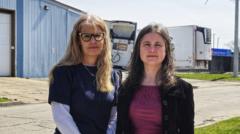As U.S. tariffs on auto imports loom, Windsor's auto workers, many with deep generational ties to the industry, express anxiety about job security and economic stability, fearing that the trade conflict risks their livelihoods.
Auto Workers in Windsor Brace for Uncertain Future Amid U.S. Tariffs

Auto Workers in Windsor Brace for Uncertain Future Amid U.S. Tariffs
In Windsor, Ontario, workers fear the repercussions of new U.S. tariffs as the auto sector faces turbulent times.
In Windsor, Ontario, often regarded as Canada's automobile heartland, workers prepare for a potentially challenging future as new tariffs from the U.S. complicate the automotive industry landscape. Many of the employees, like Kathryn Lawton, represent generations of workers dedicated to Ford, facing uncertainty as President Trump's recent auto tariffs come into play. "These were never American jobs; they were Canadian jobs," Lawton told the BBC, defending the region's long-standing connection to the automotive sector.
In a city historically intertwined with Detroit's Motor City legacy, Windsor remains a crucial player, still hosting major factories despite significant manufacturing losses over the years. Currently, around 24,000 people in Windsor-Essex are employed in automotive roles, while approximately 120,000 jobs are linked to the industry. As fears grow regarding the weight of these tariffs—25% on foreign vehicles and additional duties on steel and aluminum—workers share sentiments of anxiety and desperation, highlighting direct impacts on their families and communities.
The situation mirrors past crises such as the 2008 financial downturn, which rattled many households as automakers faced bankruptcy. John D'Agnolo, president of Unifor Local 200, emphasizing the situation's severity, stated, "I think we're going to see a recession," urging workers to refrain from spending in light of job insecurity.
Struggling with the prospect of potential job loss, assembly line workers express their dismay at feeling blindsided by new tariffs from their closest ally. As Christina Grossi, a Ford employee, pointed out, her worries extend beyond financial stability; she grapples with the loss of pride tied to her work and the value it brings to her community.
Political responses are intensifying, with the upcoming Canadian federal election pushing various parties to unveil strategies aimed at supporting the auto sector. Prime Minister Mark Carney proposes a $1.4 billion fund to enhance industry competitiveness, while Conservative leader Pierre Poilievre suggests tax cuts and support funds. The ongoing uncertainty leaves residents and business owners in Windsor reeling, with local economy heavily dependent on the auto industry.
Restaurant owner Van Niforos, who has seen business flourish thanks to workers from the Stellantis plant, fears for his own future if the automotive sector declines. "It’s a devastating situation," he lamented, highlighting the interconnected nature of local jobs and the auto industry's fate.
As auto workers like Chad Lawton voice their concerns, the reality of navigating potential trade negotiations and the uncharted territory of the evolving economy stands at the forefront of Windsor's collective anxiety. Lawton reflected that after decades with Ford, this uncertainty is unprecedented, adding, "I've never seen anything close to this."
In a city historically intertwined with Detroit's Motor City legacy, Windsor remains a crucial player, still hosting major factories despite significant manufacturing losses over the years. Currently, around 24,000 people in Windsor-Essex are employed in automotive roles, while approximately 120,000 jobs are linked to the industry. As fears grow regarding the weight of these tariffs—25% on foreign vehicles and additional duties on steel and aluminum—workers share sentiments of anxiety and desperation, highlighting direct impacts on their families and communities.
The situation mirrors past crises such as the 2008 financial downturn, which rattled many households as automakers faced bankruptcy. John D'Agnolo, president of Unifor Local 200, emphasizing the situation's severity, stated, "I think we're going to see a recession," urging workers to refrain from spending in light of job insecurity.
Struggling with the prospect of potential job loss, assembly line workers express their dismay at feeling blindsided by new tariffs from their closest ally. As Christina Grossi, a Ford employee, pointed out, her worries extend beyond financial stability; she grapples with the loss of pride tied to her work and the value it brings to her community.
Political responses are intensifying, with the upcoming Canadian federal election pushing various parties to unveil strategies aimed at supporting the auto sector. Prime Minister Mark Carney proposes a $1.4 billion fund to enhance industry competitiveness, while Conservative leader Pierre Poilievre suggests tax cuts and support funds. The ongoing uncertainty leaves residents and business owners in Windsor reeling, with local economy heavily dependent on the auto industry.
Restaurant owner Van Niforos, who has seen business flourish thanks to workers from the Stellantis plant, fears for his own future if the automotive sector declines. "It’s a devastating situation," he lamented, highlighting the interconnected nature of local jobs and the auto industry's fate.
As auto workers like Chad Lawton voice their concerns, the reality of navigating potential trade negotiations and the uncharted territory of the evolving economy stands at the forefront of Windsor's collective anxiety. Lawton reflected that after decades with Ford, this uncertainty is unprecedented, adding, "I've never seen anything close to this."




















